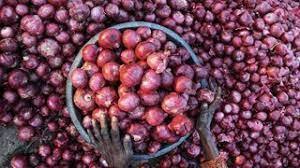Aakanksha Jetley, Pune
In an effort to combat the ongoing rise in food prices, the National Cooperative Consumers’ Federation of India (NCCF) has announced a plan to sell onions at a subsidised price of Rs 25 per kg beginning August 21. This strategic move follows closely after the government’s imposed a 40% export levy on onions, a step aimed at reducing exports and increasing the domestic supply of this critical item. These initiatives are meant to mitigate rising prices, particularly in the run-up to the festive season.
“The notification shall come into force with immediate effect and will remain in force up to and inclusive of December 31, 2023,” the government stated, emphasising its commitment to ensuring a stable and affordable food supply.
The onion buffer stock is now at 3 LMT (lakh metric tonnes); however, this amount is scheduled to be increased to 5 LMT to offset market trends. This phase is accompanied by a mandate to the NCCF and NAFED to get 1 LMT of onions to achieve a balanced distribution. “The retail sale of onions will be suitably enhanced in the coming days by involving other agencies and e-commerce platforms,” the government added.
This preventive measure was taken in response to the previously observed unexpected inflationary tendency in tomato prices, which caused tomato prices to rise beyond Rs 200 per kg in several marketplaces. The Centre’s quick response is intended to avert a similar occurrence with onions. In July, consumer price index (CPI) inflation reached a 15-month high of 7.44 per cent, owing primarily to rising vegetable and grain costs. The consumer food price index (CFPI), which accounts for about half of the CPI, increased to 11.51 per cent in July from 4.49 per cent in June, mainly owing to rising vegetable costs, notably tomatoes.
Moreover, steps have been taken to stabilise the pricing of commodities such as wheat, rice, pulses, and edible oils. Offloading wheat from the central pool, managing wheat prices, and boosting edible oil imports through tariff reductions are among the approaches.
This growing concern over food inflation highlights the government’s determined effort to stabilise prices and assure affordability, particularly in light of future state elections and the Lok Sabha election. The government is pursuing a multi-pronged effort to control inflation, ranging from direct market interventions to changes in export-import policies and enforcing stock limitations.
Former agriculture secretary Siraj Hussain explained, “The current problems are due to the impact of adverse weather since the beginning of the year… similar problems are likely to arise in the future as well.” The government’s efforts are driven by its commitment to address food inflation while safeguarding the population’s interests.
As India grapples with economic and geopolitical challenges, the government’s emphasis on regulating food inflation remains vital to its overall financial strategy. During his Independence Day speech, Prime Minister Narendra Modi emphasised this topic, stressing the government’s commitment to ensuring the availability and affordability of essential food commodities for Indians.
